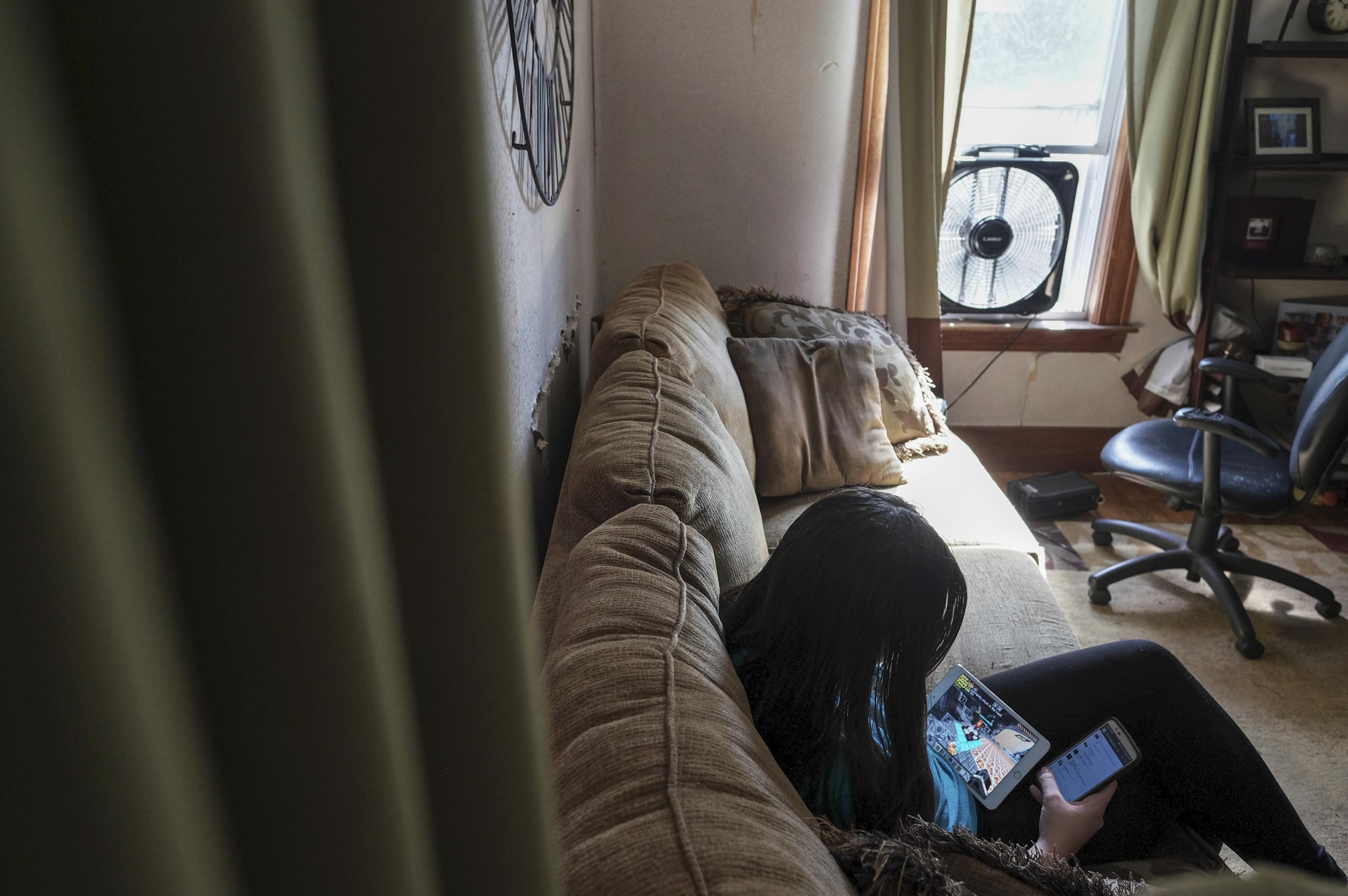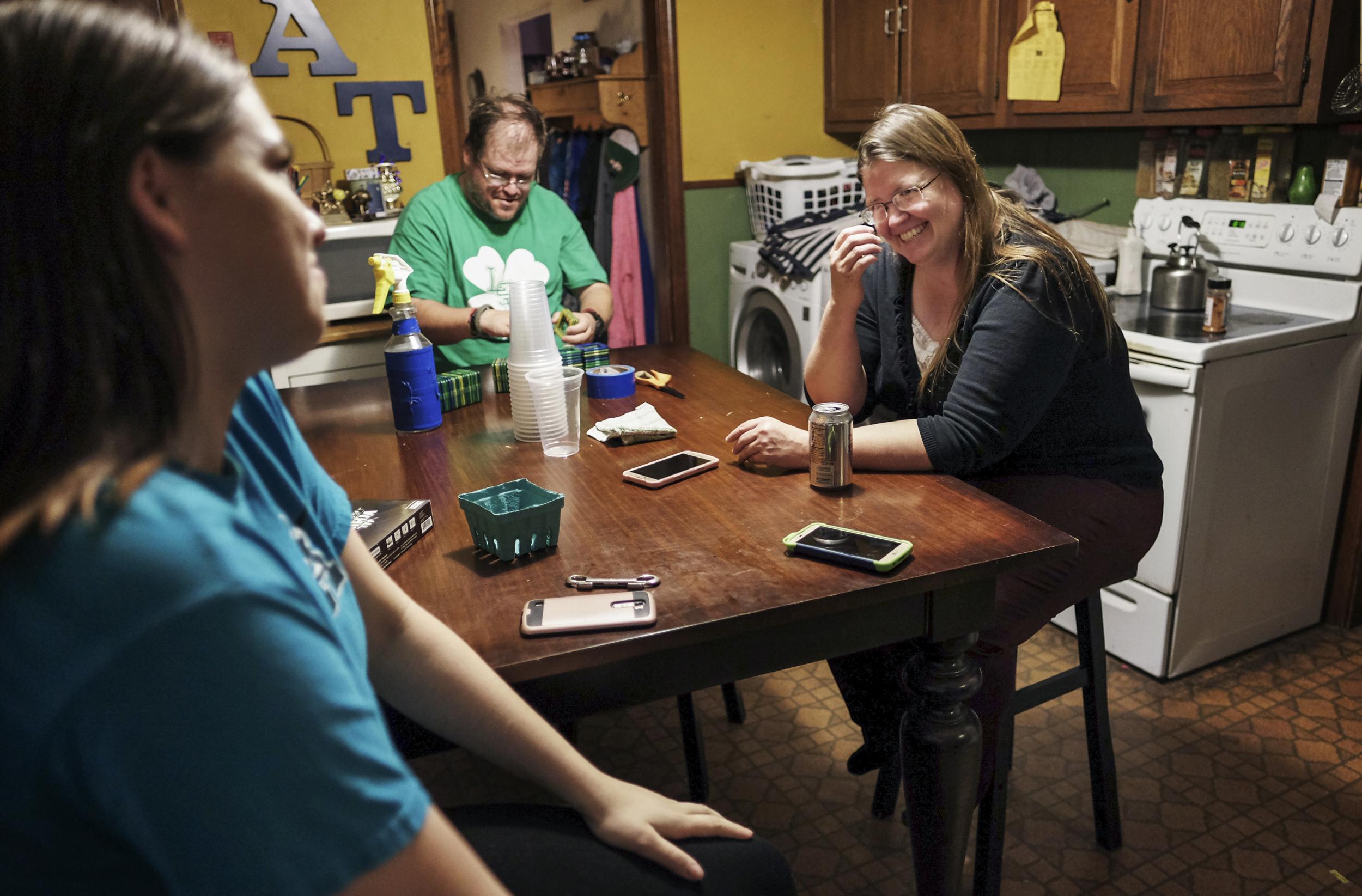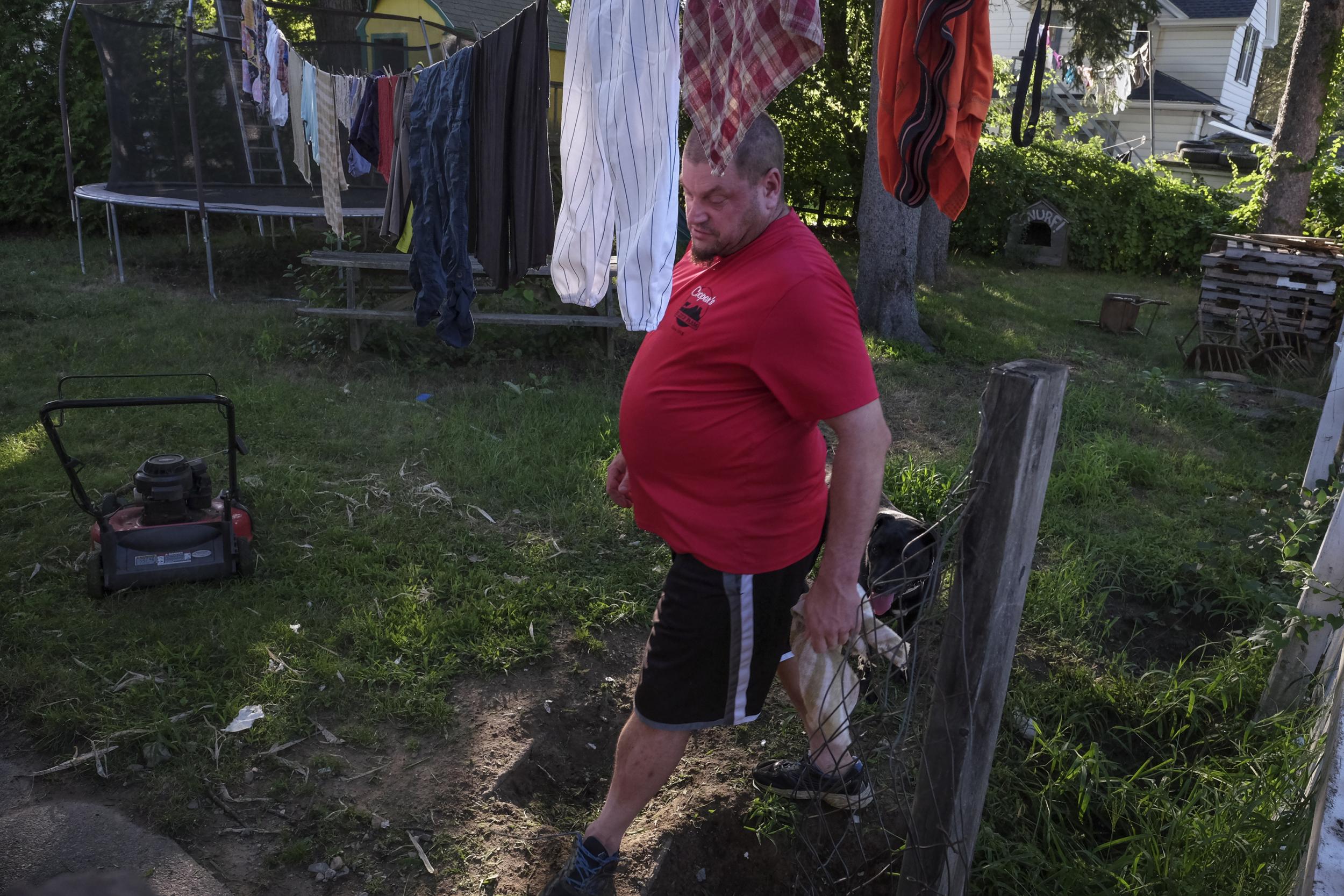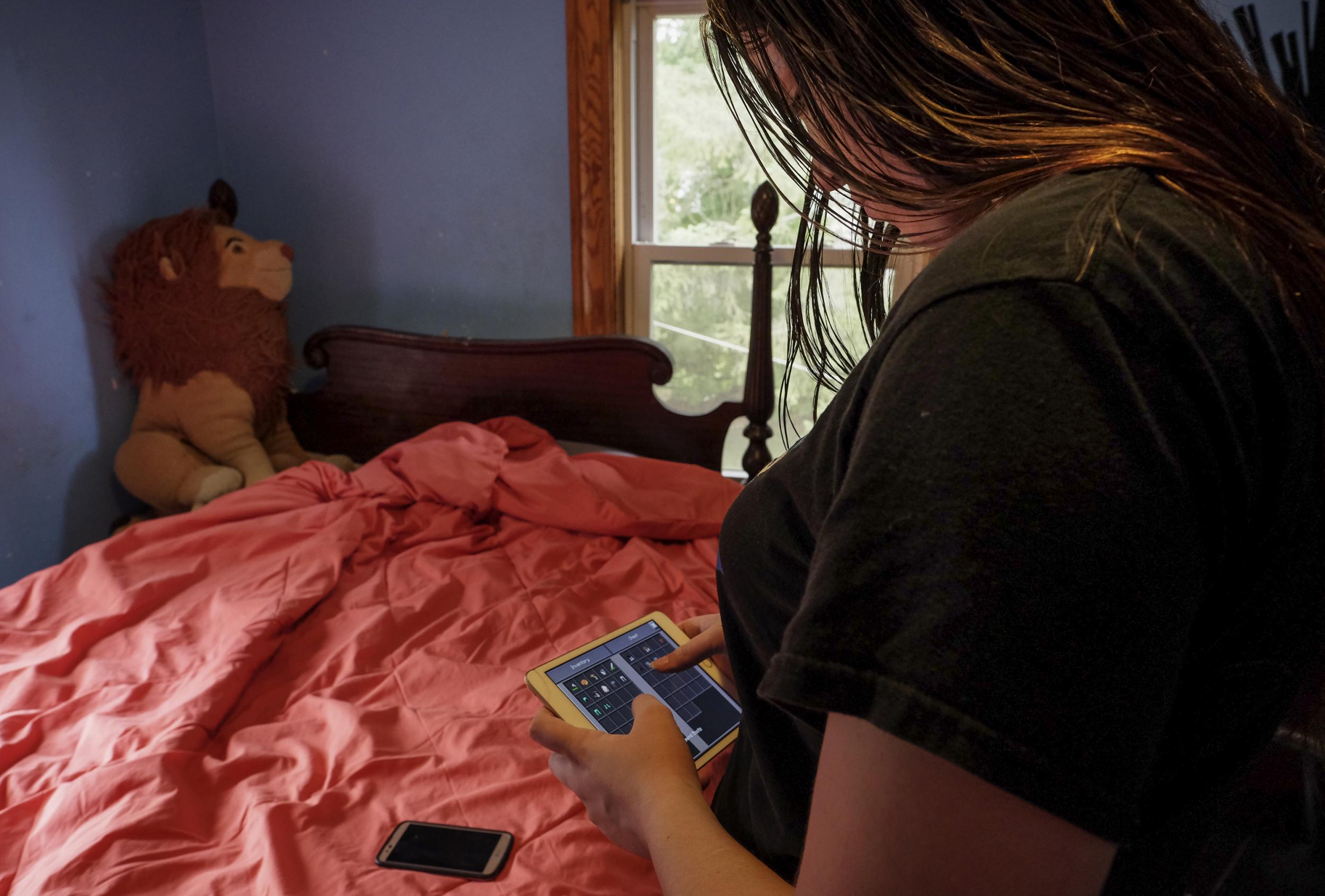The seventh-grader's sext was meant to impress a crush, but it nearly destroyed her
Boy could face jail time and registration as a sex offender but no-one in the small Massachusetts community expects him to

Your support helps us to tell the story
From reproductive rights to climate change to Big Tech, The Independent is on the ground when the story is developing. Whether it's investigating the financials of Elon Musk's pro-Trump PAC or producing our latest documentary, 'The A Word', which shines a light on the American women fighting for reproductive rights, we know how important it is to parse out the facts from the messaging.
At such a critical moment in US history, we need reporters on the ground. Your donation allows us to keep sending journalists to speak to both sides of the story.
The Independent is trusted by Americans across the entire political spectrum. And unlike many other quality news outlets, we choose not to lock Americans out of our reporting and analysis with paywalls. We believe quality journalism should be available to everyone, paid for by those who can afford it.
Your support makes all the difference.She crunched the cookies in her mouth, carefully mashing them into chunks. She spit. They made a plunk sound as they hit the toilet water. The worst, the absolute worst thing had happened, and now, Maureen was sure, this was her only option.
“Moommm,” she called down the stairs. “I puked!”
She could not show her face in the seventh grade. She had to play sick. All day she lay crumpled on the couch, replaying what he'd said to persuade her.
You're so beautiful.
Don't be ashamed of your body.
I won't show anyone.
Then, last night, when he admitted he'd shown the photo to a few people:
“Don't even come to my funeral,” she texted him.
I'll piss on your grave, b——.
At least she had been wearing a bra and underwear. The camera flash reflected in the mirror had hidden her face, hadn't it?
But he knew. And by the end of the day, everyone else would, too.
It would be months before she would learn she wasn't the only girl who had fallen for his promises, who had trusted him.
She heard her dad come in from work. She heard the phone ring.
Then he was barreling out of the kitchen, the phone still in his hand. He stopped in the doorway to the living room. A sign above his head read, “Yesterday's Memories Are Tomorrow's Treasures.”
“Your principal called,” he said. “What pictures is he talking about?”

When Maureen's parents were in middle school, if a girl wanted to show a boy her body in the middle of the night, she would have to sneak out of her house, find a way to get to his, evade his parents and yank up her shirt. For their daughter, all it took was a few clicks.
A few months before, Maureen had started messaging on Kik with a tall, athletic boy in her class. They weren't officially dating, but they talked every day. For weeks he asked for her picture. When she sent one, he asked for more. She liked him. She believed him when he said he would delete them. By March, the middle school crush had fizzled, but he still had the three photos she sent. One day, another girl in their class saw one of them on his phone. The next day, while Maureen was hiding at home, she says he texted it around the lunchroom.
At her parents' request, Maureen and her family members are being identified only by their middle names. The boy involved is not being named because he is a minor. His mother declined on behalf of her family to participate in this article. The principal of Maureen's Auburn, Massachusetts, middle school also declined to comment.
Maureen's parents believe the boy was suspended from school for a few days; their daughter was expected to learn her lesson and move on. The ordeal began in March 2014, when Maureen was 13 years old.
Law enforcement agencies could have told her parents how truly ordinary their situation was. Sexting has gained a presence in every kind of school - rich and poor, urban and rural, big and small. As phones make their way into the hands of younger and younger kids, the incidents have grown more complex: Students collect their peers' nude photos in passcode-protected Dropboxes, private Instagram accounts and apps disguised as calculators. In Massachusetts alone, the state police computer crimes unit gets multiple calls a month from schools needing its intervention.
The story hardly ends when punishment is handed out. For every “sexting scandal” reported, an unknown multitude of parents and teens - mostly girls - are just beginning to grasp what it means to live in a world where nothing digital ever truly disappears. What do you do when your 13-year-old takes photos of her body to impress a boy, and now she's crying, stomping up the stairs, slamming her bedroom door screaming, “You don't understand!”
Then help us understand, begged Maureen's parents, Elizabeth and Michael.
“It wasn't the picture itself,” she would later explain. It was that the boy told everyone that he didn't ask for it. That she sent it because she was so desperate for his attention. Now, the comments streamed in on her social-media accounts,the new outlet for time-honored middle school cruelty.
Gross.
Slut.
Go kill yourself.
Her parents thought about sending her back to school in the next town over. But Maureen knew the kids there had heard about her, too.
“I felt like I couldn't fix it,” she said. “Like I was alone and nothing was ever going to be better.”
Elizabeth and Michael started to wonder whether they could have done something to prevent all this. Were they supposed to have expected this stuff to start in the seventh grade? They knew their tall, brown-eyed daughter had always seemed to grow up too fast.
“Even when she was 2, I would follow her around on the playground going, 'She's only 2,' because she was so tall, the 5-year-olds would want to play hide-and-seek and tag with her,” Elizabeth said.
Maureen grew up to be a vibrant, quirky kid, who loved to invent songs and tell jokes. She could spend hours drawing in charcoal pencil before jetting off to cheerleading practice, where her role was to catch the smaller girls as they came down from flips.
At school, she always seemed to be on the outskirts of fitting in. Note-passing and three-way-call eavesdropping have been replaced with disappearing-message apps and covert screen shots, but the Shakespearean drama of middle school hasn't changed much. Her friends were viciously mean one day, BFFs the next.
When one friend told her how cutting made him feel better, she started doing it, too.
Later, her parents would think that the tall, popular boy in the class must have known what it would mean to Maureen to have his attention.
She had just gotten her first cellphone that year, as she entered seventh grade. Elizabeth and Michael had argued over the decision, which today plays out in almost every family household: When should they give her a phone? It would be the convenient way to communicate with her about cheer practice, but how much could she be trusted? How could they know what she was doing on it? And was it worth paying for? As an administrative assistant and a farmworker with three children, they couldn't afford unnecessary expenses.
Michael didn't want her to have a phone at all.
“So, what, she doesn't get one until she's 18, and then we watch her go off the deep end?” Elizabeth argued. “That's not going to work, either.”
Now, after the incident, they had taken away her phone, but she was still finding out what kids were saying about her. The longer she stayed out of school, the worse the rumors. The cutting grew more frequent and more serious. Their youngest daughter learned to search her sister's room for razors. It was like the light in Maureen had been powered off. Once, she took a whole handful of Prozac, coming dangerously close to becoming another headline about a sexting scandal leading to suicide.
Instead of going back to the seventh grade, she went to overnight counseling facilities in Worcester and Boston. Each time Elizabeth and Michael heard doctors say words like “trauma” and “lack of coping skills,” they started to worry that their daughter's fears - that this moment would last forever - weren't just a 13-year-old's distorted perspective of time. They didn't want to believe it was possible that one foolish iPhone photo could derail their daughter's entire life.

The boy still had her picture. The middle school principal had called again, this time with worse - was that possible? - news.
Maureen had entered the eighth grade, and she seemed to be doing fine. Sometimes she would cry all the way to school, but when Elizabeth pulled up to the low brick building, Maureen would always get out of the car.
Now it was early November, and the principal was telling them that the boy had shown Maureen's photo at a Halloween party. It was the same picture they thought had been deleted from his phone.
She had been part of a slide show. It wasn't just her picture - there were photos of at least four other girls in the class. The girls later learned that the boy had made a game out of it: Because they had framed their photos so their faces weren't visible, the boys guessed which body belonged to which girl. One they recognized by her dark skin. Another, by a large freckle on her chest.

Before this, the middle school thought Maureen's ordeal was an isolated event. Now, they realized they were dealing with a more pervasive problem.
“I thought, we're a small, middle-class, suburban town. This isn't going to hit us,” said one of the school's counselors who asked not to be named. “But boy, was I wrong.”
She was shocked to hear “some of the brightest girls in the building” had flirted with the boy for months, and then, late at night, alone in their bedrooms and bathrooms, sent him what he asked for.
“I don't say it lightly when I say that if it can happen to them, it can happen to anybody,” the counselor said.
She brought all of the girls to a room together. Among them was one who had dated the boy for eight months. Her photos - ones she sent and ones he had taken of her - had been on the screen at the party, too. Together the girls spent hours comparing messages, realizing he had been texting them all the same smooth lines.
Meanwhile, the boy was in the principal's office again. According to students and the counselor, the boy showed the principal the password-protected app where all the photos were hidden on his phone. He had them organized into folders, one for each girl he'd won over.
The school called the police.
The news rippled across the class of 205 eighth-graders and the 16,000-person town. For Maureen, there was almost a sense of relief: Sure, more people had seen her photo, but at least she wasn't the only one being called a slut.
“There was so much shame involved for the girls who had done it,” the counselor said. “Then those girls' friends felt like, 'If I hang out with you, I'm going to be seen as like you.' And then the girls who were not involved were envious of all the attention the other girls were getting.”
Some teachers, she said, seemed to think the girls got what they asked for by being so careless.
Taylor, the boy's former girlfriend, recalled trying to explain to everyone why it had seemed just so normal at the time.
“Sixth, seventh grade is when people started sending nudes. The popular girls would send them to the popular guys . ... I would find out about it and be like, 'You know that's wrong, right?' ” she said. “I was iffy, at first. But everyone was doing it, so I just felt like I had to.”
Taylor - who is also being identified by her middle name - and the boy had been friends since they were young. Their moms went to high school together. Her family once threw him a birthday party. And now, this.
She heard he did it because his friend group had been pushing him away. This was his attempt to get back in.
On his social media accounts, anonymous commenters wrote to him that he ruined their lives.
He wrote back: “And my own.”

Every morning, Maureen puts on her makeup in the purple bathroom where she sent him the photo. Winged eyeliner has become her signature look. Tight jeans, loose T-shirt, badass eye-flair - it all says: I don't care what you think.
Now she's in high school. So is the boy. Every day, they pass in the hall.
“It doesn't even bother me,” Maureen says. “People are always like, does it bother you when you see him? I'm always like, no, why would it bother me?”
The Worcester, Massachusetts, Telegram reported that the boy is facing criminal charges: possession of child pornography, dissemination of obscene materials to minors and enticement of a child under 16. But so far, the families of Maureen and Taylor haven't heard anything about a conviction or a plea deal. A spokesman for the Worcester district attorney said the office is legally prohibited from disclosing any information about any juvenile case.
Although many states have passed laws that draw a distinction between child pornography and sexting among underage kids, Massachusetts has not. Conceivably, if convicted, the boy could face jail time and registration as a sex offender.
But chances are, he won't.

Michael Ramos, president of the National District Attorneys Association, said that in places where the law hasn't caught up with technology, it's rare for a minor to come away with a felony on his record. The consequences are usually lessened to misdemeanors, probation time, educational diversion programs or community service. In a 2013 survey of state prosecutors who had filed charges in sexting cases involving juveniles, 16 percent resulted in the defendant being registered as a sex offender. Just 4 percent led to a criminal trial.
“You're dealing with young teens, people who don't have criminal intent. Believe me, they're making some huge mistakes, ethical mistakes, but you have to come up with other solutions,” Ramos said.
Depending on the nature of the charges, Ramos said, one key factor in a prosecution would be whether the boy had “intent to harm” the girls whose pictures he showed - something that can be difficult to prove without the participation of the girls themselves. Because coming forward means that they, too, could theoretically face charges. Although they took photos of their own bodies, in a technical sense, they have produced child pornography.
Until it's sorted out, the boy will remain in school. Administrators purposefully kept him in separate classes from Maureen and Taylor. But his former girlfriend rarely comes to school anyway; after more than a year of counseling and therapy, her parents say, she still hasn't recovered.

In summer, Maureen lives in another world, where there is no boy, no girls who stare at her, no one who can see the thin scar lines on her forearms. It exists on her iPad, in an online gaming community called Minecraft.
She started playing it regularly in the first few weeks of ninth grade, when she realized that even though she was in a new school, the people were the same. To them, she was the same.
“It's not even brought up anymore,” she says. “It's just like, oh, that's [Maureen], nobody talks to her.”
But in Minecraft, they call her Queen. And Mom. The game is made up of many tiny worlds where players can unite on teams to build places completely their own. In the summer, Maureen can be in her world anytime she wants. At cheerleading camp, on the bleachers of her sister's softball games, in the car when her dad is listening to songs she rolls her eyes at. She founded her own team, and now there are more than 120 players from every corner of the world who know her. They look to her for guidance, in the game and in life.
The rules of their Minecraft world are that no one is allowed to swear or call anyone names.
“People come there because nobody can get hurt, or you'll get banned,” Maureen says.
If one of her team members gets bullied, it's Maureen who gets to report it.
“If there's a problem, like drama or something, people come to me,” she says. “And I'll solve it.”
Last week, summer ended. She started the 10th grade. She went back to the halls where every day she passes him. But after school, she can escape again, to the place where no one has seen her undressed, and she is always in control.
Washington Post
Join our commenting forum
Join thought-provoking conversations, follow other Independent readers and see their replies
Comments